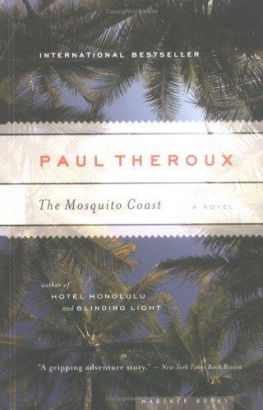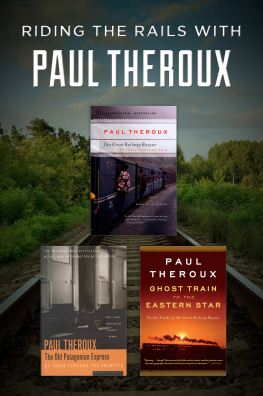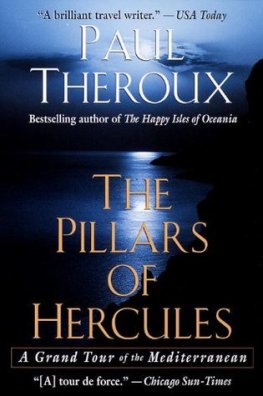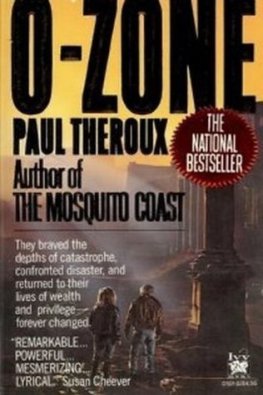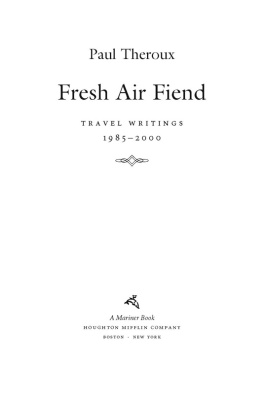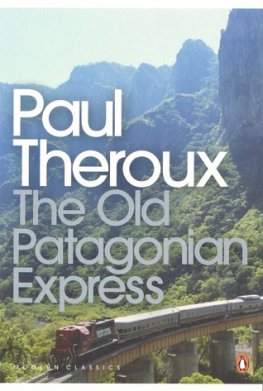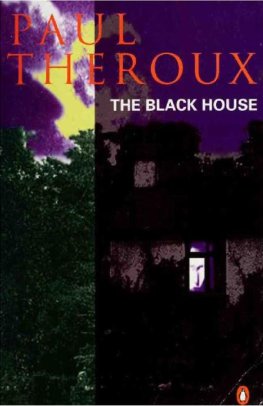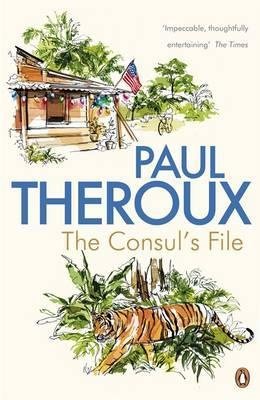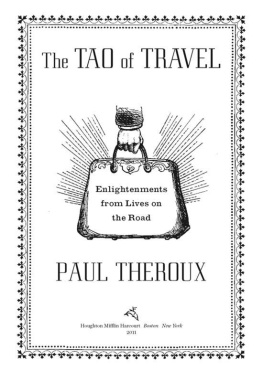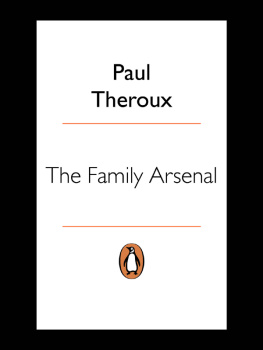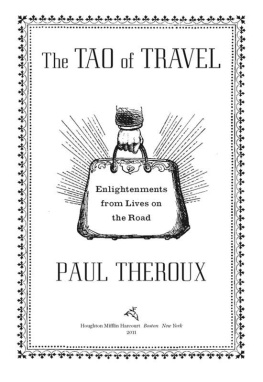Paul Theroux - The Mosquito Coast
Here you can read online Paul Theroux - The Mosquito Coast full text of the book (entire story) in english for free. Download pdf and epub, get meaning, cover and reviews about this ebook. year: 1981, genre: Art. Description of the work, (preface) as well as reviews are available. Best literature library LitArk.com created for fans of good reading and offers a wide selection of genres:
Romance novel
Science fiction
Adventure
Detective
Science
History
Home and family
Prose
Art
Politics
Computer
Non-fiction
Religion
Business
Children
Humor
Choose a favorite category and find really read worthwhile books. Enjoy immersion in the world of imagination, feel the emotions of the characters or learn something new for yourself, make an fascinating discovery.
- Book:The Mosquito Coast
- Author:
- Genre:
- Year:1981
- Rating:3 / 5
- Favourites:Add to favourites
- Your mark:
- 60
- 1
- 2
- 3
- 4
- 5
The Mosquito Coast: summary, description and annotation
We offer to read an annotation, description, summary or preface (depends on what the author of the book "The Mosquito Coast" wrote himself). If you haven't found the necessary information about the book — write in the comments, we will try to find it.
The Mosquito Coast — read online for free the complete book (whole text) full work
Below is the text of the book, divided by pages. System saving the place of the last page read, allows you to conveniently read the book "The Mosquito Coast" online for free, without having to search again every time where you left off. Put a bookmark, and you can go to the page where you finished reading at any time.
Font size:
Interval:
Bookmark:
| The Mosquito Coast | |
| Paul Theroux | |
| Mariner Books (1981) | |
| Rating: | |
| Tags: | Fiction, Suspense, Action Adventure, Literary, Adventure fiction, Americans, Domestic fiction, Family Life, Americans - Honduras, Honduras Fictionttt Suspensettt Action Adventurettt Literaryttt Adventure fictionttt Americansttt Domestic fictionttt Family Lifettt Americans - Hondurasttt Hondurasttt |
Product Description
In a breathtaking adventure story, the paranoid and brilliant inventor Allie Fox takes his family to live in the Honduran jungle, determined to build a civilization better than the one they've left. Fleeing from an America he sees as mired in materialism and conformity, he hopes to rediscover a purer life. But his utopian experiment takes a dark turn when his obsessions lead the family toward unimaginable danger.
About the Author
PAUL THEROUX is the author of many highly acclaimed books. His novels include _A Dead Hand_ and The Mosquito Coast, and his renowned travel books include Ghost Train to the Eastern Star and _Dark Star Safari_. He lives in Hawaii and on Cape Cod.
Paul Theroux
The Mosquito Coast
First published in 1982
To "Charlie Fox," whose story this is and whose courage showed me that the brave cannot be killed. With grateful thanks for many hours of patient explanation and good humor in the face of my ignorant questioning. May he find the peace he deserves on this safer coast.
Naksaa.
P.T.
I
BANANA BOAT
WE DROVE past Tiny Polski's mansion house to the main road, and then the five miles into Northampton, Father talking the whole way about savages and the awfulness of America - how it got turned into a dope-taking, door-locking, ulcerated danger zone of rabid scavengers and criminal millionaires and moral sneaks. And look at the schools. And look at the politicians. And there wasn't a Harvard graduate who could change a flat tire or do ten pushups. And there were people in New York City who lived on pet food, who would kill you for a little loose change. Was that normal? If not, why did anyone put up with it?
"I don't know," he said, replying to himself. "I'm just thinking out loud."
Before leaving Hatfield, he had parked the pickup truck on a rise in the road and pointed south.
"Here come the savages," he said, and up they came, tracking across the fields from a sickle of trees through the gummy drizzling heat-outlines of Polski's barns. They were dark and their clothes were rags and some had rags on their heads and others wide-brimmed hats. They were men and boys, a few no older than me, all of them carrying long knives.
Father's finger scared me more than the men did. He was still pointing. The end of his forefinger was missing to the big knuckle, so the finger stump, blunted by stitched skin folds and horribly scarred, could only approximate the right direction.
"Why do they bother to come here?" he said. "Money? But how could it be money?"
He seemed to be chewing the questions out of his cigar.
It was mid-morning, already too hot for Massachusetts in May. The valley looked scorched from the dry spring we were having, and the shallow ditches were steaming like fresh cowflap. In the furrows that had been torn from one field's end to the other, only tiny palm plumes of Wonder Corn were showing. Not a single bird twittered here. And the asparagus fields, where the men were headed, were as brown and smooth as if the green scalp of grass had been peeled off and the whole baldness steamrolled.
Father shook his head. He released the brake and spat out of the window. He said, "It sure as heck isn't money. These days a dollar's only worth twenty cents."
Beyond Hatfield and Polski's house, and at the top edge of the valley trough, were leafy battlements, some as pale as lemonade froth and others dark bulges and beetle heaps of bush, and stockades of bursting branches that matched my idea of encircling jungle. A few hours before, when we had woken up, the ground had been covered in glitter beads of cold dew. I thought of it as summer ice. I had breathed out clouds of vapor then. There were pouches of cloud in the sky. Now the sun was up high, filling the valley with light and heat that blazed against those men and made them into skinny demons.
Maybe this was the reason that, though I had seen the men before - the savages, in that very place and close enough to notice the way the sun left black bruises on their leather-brown skin - the sight of them had alarmed me, like Father's finger.
"This place is a toilet," he said as we entered Northampton. He wore a baseball cap and drove with his elbow out the window. "It's not the college girls, though they're bad enough. Look at Tugboat Annie over there, the size of her. She's so big it would only take eleven of her kind to make a dozen. But that's fat - that's not health. That's cheeseburgers." And he stuck his head out the window and hollered, "That's cheeseburgers!"
Down
Main Street
("They're all on drugs"), we passed a Getty station and Father howled at the price of gas. TWO SLAIN IN SHOOTOUT was the sign on a newspaper stand, and he said, "Crapsheets." Just the word Collectibles, on a storefront, irritated him. And near the hardware store there was a vending machine that sold ice by the bag.
"They sell ice - ten pounds for a half a buck. But water's as free as air. Those dingbats are selling water! Water's the new growth industry. Mineral water, spring water, sparkling water. It's big news - water's good for you! Low-cal beer - know what's in it? Know why it keeps you thin? Know why it costs more than the regular? Water!"
Father said it in the Yankee way, wattuh.
He cruised around, getting grumpier, until he found a meter with time left on it. Then he parked and we walked back to the hardware store.
"I want a rubber seal, eight feet of it, with foam backing," Father said, and while the man went to get it, he said, "And that's probably why gas is so expensive. They put water in it. You don't believe me? If you insist there's morality in merchandising" - but I hadn't said a word - "then maybe you'd like to explain why two-thirds of government-inspected meat has substantial amounts of cancer-inducing nitrates in it, and junk food - this is a proven fact - has no nutritional value whatsoever - "
The hardware clerk returned with a coil of rubber and handed it to Father, who examined it and gave it back.
"Don't want it," he said.
"That's what you asked for," the man said.
Father made a pitying face. "What are you, working for the Japanese?"
"If you don't want it, just say so."
"I just said so, Jack. It's made in Japan. I don't want my hard-earned bucks turned into foreign exchange for the sons of Nippon. I don't want to bankroll another generation of kamikazes. I want an American length of rubber seal, with foam - Do you work here?" And he cursed, because the man had walked away and begun serving another customer.
Father found the rubber seal he was looking for at a smaller hardware store on a back street, but by the time we got back to the pickup truck he was having fits over what he wished he had said at the first hardware store. "I should have said 'Sayonara,' I should have made a scene."
A policeman had his hands clasped over our parking meter, resting on it, with his chin on his fingers, like a goldbricker leaning on a shovel handle. He looked at Father and sort of smiled hello, and then he saw me and chewed his lips.
"Shouldn't he be in school?"
"Sick," Father said without breaking his stride.
The policeman followed Father to the door of the pickup and hooked his thumbs in his gun belt and said, "Hold on. Why isn't he in bed, then?"
Font size:
Interval:
Bookmark:
Similar books «The Mosquito Coast»
Look at similar books to The Mosquito Coast. We have selected literature similar in name and meaning in the hope of providing readers with more options to find new, interesting, not yet read works.
Discussion, reviews of the book The Mosquito Coast and just readers' own opinions. Leave your comments, write what you think about the work, its meaning or the main characters. Specify what exactly you liked and what you didn't like, and why you think so.

